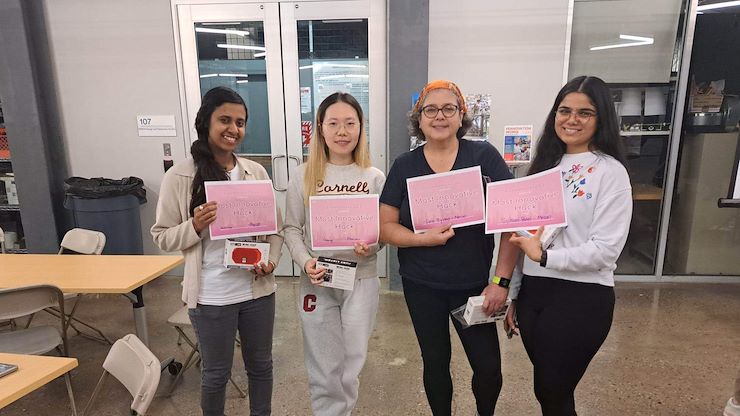
MCCC Computer Science student Lina Byland and her FemmeHacks team, hold up certificates for Most Innovative Hack during the annual hackathon event at the University of Pennsylvania. Byland runs the Codebreakers Club intended for Computer Science students to learn from one another during the semester. Photo courtesy of Lina Byland.
A new club at Montgomery County Community College gives students interested in Computer Science an opportunity to connect on and offline.
The Codebreakers Club connects students interested in computer programming looking to meet like-minded individuals and work on projects together. Students at both campuses can help each other with homework, explore elements of computer science and attend events together.
Dr. Kendall Martin, Computer Science Professor and the club’s faculty advisor, said Codebreakers Club is an outgrowth of the Java Boot Camp program run by upper level students in between semesters to help prepare lower level Computer Science students for the upcoming work ahead by teaching them skills they’ll need. The program is run through the Women in Science and Technology (WIST) and funded by the WIST/STEM department.
“We rebranded,” said Martin. “Boot Camp sounded too harsh. And Java isn’t the only thing we talk about. Again, we had students from WIST step forward and serve as mentors. We brainstormed and decided the new name needed to be friendlier and more supportive. So, it was changed to Codebreakers.”
Students can sign up for the club from the Montco Connect internal portal or by reaching out to WIST members or current Codebreakers Club members.
“The emphasis is on connection,” said Martin, “and people not feeling isolated.”
A large focus of the Codebreakers Camp was on improving students’ time management skills, an area identified both by students and faculty members as a big need. Computer Science students Lina Byland and Adam Patelunas served as student mentors. They assigned projects to students each week to help emphasize breaking projects down into smaller tasks to complete each day and thus manage their time incrementally each week.
The Codebreakers Club is less structured. Byland is the club’s current administrator, but club members write posts, discuss various computer science related topics and decide the agenda during meetings together.
“It’s nice to have something around the entire semester,” said Byland. “So many of our classes are online synchronous and asynchronous. People miss face to face. With learning something new, especially coding, it’s easy to feel like ‘I don’t understand this. Maybe I’m stupid.’ No, it’s just another language.”
Byland holds a bachelor’s degree in art from UCLA and a master’s degree in art history from California State University at Northridge in 1994. The mom of two was working as an administrative assistant at a Montessori preschool prior to the pandemic, where she learned how to make updates to the school’s website. When the pandemic hit, she quit her job and decided to pursue an interest in coding and computer science, which ultimately led her to MCCC.
Codebreakers Club also will be organizing trips to Hackathon events off campus. Hackathons, Martin explained, have nothing to do with “black hat hacking.”
“They come from (author, engineer, and inventor) Rube Goldberg about joining together to build something novel and interesting,” she said. In the past, Hackathon events, like the international PennApps Hackathon at the University of Pennsylvania, had a winning team of students modify “a microwave oven to play highly-rated YouTube videos while an item is cooking, with the length of the video determined by the time needed to cook the item,” according to Technical.ly
Martin said the events like the PennApps Hackathon garner thousands of students, however, the events and the computer science field in general tend to feel very male dominated. To help the space feel more inclusive, Penn also hosts FemmeHacks, an inclusive, women, gender non-binary and historically underrepresented groups hackathon. After forming teams, attendees build a variety of web, mobile, and hardware applications, learn from workshops, and attend various speaker events. Byland and some of the Codebreakers attended this year’s FemmeHacks and had a blast.
“FemmeHacks was an amazing experience,” she said. “I was part of a team that won "Most Innovative Hack," so Montco was well represented.”
The Codebreakers are planning to attend Drexel University’s annual hackathon “Philly Codefest” March 11-12. This year’s theme is "AI Everywhere." “Participants will work to create real-world, scalable software and hardware solutions to improve and expand artificial intelligence’s (AI) positive societal impacts.”
Byland said the Codebreakers are always looking for new people to join the club. It officially meets Tuesdays at 6 p.m. and Fridays at 10 p.m. but there is plenty of flexibility for those unable to make those days or times. Students can contact Byland through Montco Connect for full information.
